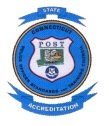Law Enforcement Accreditation
|
|
|
The Commission on Accreditation for Law Enforcement Agencies, Inc., (CALEA®) was created in 1979 as a credentialing authority through the joint efforts of law enforcement's major executive associations: International Association of Chiefs of Police (IACP); National Organization of Black Law Enforcement Executives (NOBLE); National Sheriffs' Association (NSA); and the Police Executive Research Forum (PERF).
The purpose of CALEA’ s law Enforcement Accreditation program is to improve the delivery of public safety services, primarily by: maintaining a body of standards, developed by public safety practitioners, covering a wide range of up-to-date public safety initiatives; establishing and administering an accreditation process; and recognizing professional excellence.
The Connecticut State Police became involved in the accreditation process in 1985 and became officially accredited in 1988. The Agency has been re-accredited in 1993, 1998, 2001, 2004, 2007, 2010, 2013 and 2016. Maintaining “accredited status” is an on-going project for all accredited law enforcement agencies and requires constant monitoring and periodic updating of policies and procedures to ensure compliance with internationally accepted law enforcement accreditation standards.
Specifically, CALEA’s goals are to:
- Strengthen crime prevention and control capabilities;
- Formalize essential management procedures;
- Establish fair and nondiscriminatory personnel practices;
- Improve service delivery;
- Solidify interagency cooperation and coordination; and
- Increase community and staff confidence in the agency.
The Connecticut State Police was the second law enforcement agency in Connecticut and the third state police agency in the United States to receive International Law Enforcement Accreditation. As of November of 2011, there were 1020 agencies in the process of accreditation and 761 fully accredited agencies in the United States, Canada, Barbados and Mexico. The size of accredited agencies varies from six to over eleven thousand personnel. The Connecticut State Police remains one of the largest accredited agencies. There are seventeen accredited police agencies in Connecticut and two in self-assessment.
The CALEA Accreditation Process is a proven modern management model; once implemented, it presents the Chief Executive Officer (CEO), on a continuing basis, with a blueprint that promotes the efficient use of resources and improves service delivery—regardless of the size, geographic location, or functional responsibilities of the agency.
This accreditation program provides public safety agencies an opportunity to voluntarily demonstrate that they meet an established set of professional standards which:
- Require an agency to develop a comprehensive, well thought out, uniform set of written directives. This is one of the most successful methods for reaching administrative and operational goals, while also providing direction to personnel.
- Provide the necessary reports and analyses a CEO needs to make fact-based, informed management decisions.
- Require a preparedness program be put in place—so an agency is ready to address natural or man-made critical incidents.
- Are a means for developing or improving upon an agency's relationship with the community.
- Strengthen an agency's accountability, both within the agency and the community, through a continuum of standards that clearly define authority, performance and responsibilities.
- Can limit an agency's liability and risk exposure because it demonstrates that internationally recognized standards for law enforcement have been met, as verified by a team of independent outside CALEA-trained assessors.
- Facilitates an agency's pursuit of professional excellence.
Accreditation Public Comment Portal
The purpose of this public portal is to receive comments regarding an agency's compliance with CALEA standards, engagement in the service community, delivery of public safety services, and overall candidacy for accredited status. These comments can be in the form of commendations or concerns. The overall intent of the accreditation process is to provide the participating agency with information to support continuous improvement, as well as foster the pursuit of professional excellence.
Please use the link below to submit feedback: https://cimrs2.calea.org/
|
|
State Accreditation |
In addition to CALEA accreditation, the Connecticut State Police is also accredited in the state program. State accreditation is a process through which law enforcement agencies demonstrate excellence in management and service delivery by complying with state accreditation standards. This is a no-cost, voluntary, self-directed process accessible to all Connecticut departments regardless of size or resources.
The State Accreditation Standards for Local Police Agencies Program are run by the Connecticut Police Officer Standards and Training Council (POST Council). The members of the Council are a public board appointed by the Governor and include federal, state and local law enforcement managers along with public members.
The Connecticut Law Enforcement Accreditation Program consists of 327 standards achievable in three successive tiers:
(1) Liability Certification (124 standards);
(2) Professional Certification (83 standards); and
(3) General Management (120 standards).
For further information on the Accreditation process, please contact the Connecticut State Police Accreditation Unit at (203)-630-4357
or
The Commission on Accreditation for Law Enforcement Agencies, Inc in Virginia
at (703)352-4225 or visit their website at www.calea.org.
For more information visit the Police Officer Standards and Training Council web page and view the Accreditation Division section http://www.ct.gov/post




